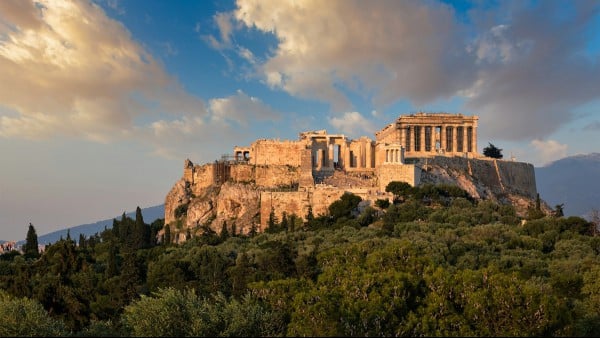When In Rome, Talk Like The Romans Do: Roman Expressions And Sayings
Have you ever had a conversation with a Roman only to realize halfway through that you can’t understand a word they’re saying? Netflix recently released “Tear Along the Dotted Line,” an animated series by Zerocalcare set in Rome. But if you didn’t grow up in or live in Rome, the show can be challenging to understand. If you’re having a little trouble, you’re not alone. With its unique expressions and accent, the Roman dialect can be daunting, even for native Italian speakers! In fact, a lot of people consider Roman to be less of a dialect and more of a language in and of itself! Luckily, we compiled over 50 Roman sayings, slang terms, and expressions that will help you navigate Rome, even in the most challenging situations! In bocca al lupo! Good luck!
The Origins And Meaning Of Common Roman Sayings
A buffo
In standard Italian, buffo means funny, but in Roman, there’s no funny business about it. The etymology of buffo is unclear. Some say that it came from Rome by way of Genoa or Venice, while others assert that it has French roots. Others say it imitates the sound that someone makes when they’re blowing something up. A buffo means “on credit” (or “in installments,” and therefore “blowing things up,” but we’ll come back to that later). It can also be used instead of “for no reason.”
A chi tocca nun se ‘ngrugna
Literally meaning “If it’s their turn, they don’t get offended,” this expression means “If something happens to you, don’t take it personally; keep moving forward.”
Abbozzà
This is verb is essential because it’s used on a regular basis. It means “to patiently endure, tolerate and suffer passively.”
Accannà
Like New Yorkers, Romans tend to be rather brusque and have little patience or tolerance for small talk. If you’re particularly talkative, don’t be surprised if someone asks you to accannare, or “cut it out.”
Acchittasse
To get or be dressed up.
Accollasse
Of all the Roman sayings, accollasse is one that summarizes the average Roman’s philosophy: it means “to be a burden,” or “to invite yourself to something,” etc. The verb accollare is also used as a transitive verb. For example, someone might say, “A coworker called in sick, so my boss forced me, mi ha accollato, to come into work.” But this word can also be a noun. If you say that someone “è proprio un accollo!” it means that “they’re a real pain.” In general, if someone is being an accollo, people will ask them to accannare.
Adavede
Literally meaning, “you should see,” adavede is used to reiterate or confirm something that was just said.
Ammazza!
It literally means “Kill!” and it’s not clear where the word comes from. Some say it derives from the Italian word mazza, which means a club or a bat — instruments to commit the perfect kill. Another, less probable, source maintains that it comes from the plebeians’ bloodthirsty cry during a gladiatorial combat at the Colosseum. Today, ammazza is used to denote admiration or surprise, similar to how we would use “wow!” or “goodness,” in English: Ammazza, quanto mangi! (Goodness, how much you eat!). You may also hear it as “ammappa.”
Annà in puzza
A lot of Roman expressions are metaphors, and annà in puzza is no exception. It doesn’t mean “start to stink.” Instead, it’s used for people who start to get irritated because people are picking on them.
Aripijate
Meaning something to the effect of “get your head back in the game” or “wake up,” fans regularly yell aripijate at AS Roma players during a game.
Arzà
This Roman expression is what we call a “false friend,” or something that looks like it means one thing but means something entirely different. In Rome, the verb alzare has two meanings: one is the same as in standard Italian, “to lift,” while the other definition is “to loan.”
Avoja
One of several quintessential Roman sayings, the term avoja is an integral part of the Roman dialect. In fact, no dictionary is complete without it. The word doesn’t have a single definition. Instead, it has several meanings including: yes, of course, absolutely, a lot, a ton, etc.
Bajocchi
Americans call it dough or cash, while Brits call it coin or quid. When the Romans refer to money, they call it bajocchi. At the end of the 19th century in the Papal States, there was a coin called the baiocco. The currency was replaced, but the word stuck.
Battere i pezzi
This expression is almost impossible to decipher. Battere i pezzi means “to pursue someone romantically,” and “to try to impress someone.” Despite the Romans’ insistence that this expression is perfectly understandable for non-Romans, it continues to baffle most Italians.
Boro
An entire master’s thesis could be written on the difference between hillbilly, hick and redneck, but in any case, all these terms refer to someone who is unrefined in how they dress and talk.
Burino
From the Latin buris, which means plow beam, the word burino was reserved for non-Romans and especially those who lived and worked in other parts of Lazio doing agricultural jobs. Today, it is used to describe someone rude and uncultured. Ma che burino sei?! (How are you such a lout?!)
Buzzuro
This is another word with a similar meaning to burino and a rather interesting etymology. It derives from the obsolete German term butzen — which is where the German word putzen (to clean) comes from. At first, it was used to describe itinerant workers from Switzerland who visited Rome in the winter to clean the streets or sell chestnuts. Today, it is used to describe someone uncouth and ill-mannered. “Ma ‘sto buzzuro, chi è?” (But, who is this lout?)
Caciara
Unlike most other terms on this list, this term has already become commonplace outside of Rome, and most people will understand what it means: confusion or chaos.
Cecagna
You know the fatigued feeling you get when your eyelids start to get heavy after eating a little too much at an all-you-can-eat buffet? Romans call this feeling cecagna, or the lethargy you feel after eating your meal. Why is it called cecagna? Because after you close your eyes, you go cieco, or blind.
Corcà
This term is often associated with boots, for example: “l’hanno corcato de botte,” or “they stamped it into the ground [with their boots.]” Corcare can also mean “to beat someone up” or to “manhandle them.”
Dà i resti
When you’re in a situation where you’re wondering who to dà i resti, or give the rest to, it means you’re between a rock and a hard place and don’t know what the right decision is. The origin of this expression is absolutely fascinating: it comes from a time when the butcher’s apprentices had to decide who to give the day’s scraps to. Surrounded by panhandlers and poor people, the apprentice was in the unenviable position where he had to choose and didn’t know “who to give the rest to.”
Daje
Daje is one of the most essential Roman expressions that’s written on T-shirts, postcards, walls, books, store signs and more. Daje is the Roman version of the expression “dai” and can be used in any context: to urge someone to do something, to encourage someone, to make someone, to scold someone, to express happiness, to confirm something, etc.
Dasse
This means darsi, or the reflexive verb of dare, meaning “to give.” Still unclear? In Italian, darsi is used in a few idiomatic expressions, for example “darsi delle arie,” or to be full of oneself; “darsi pace,” to accept something, etc. But in Rome, darsi can also mean “to leave.”
De coccio
If someone says you’re de coccio, it means you’re either dense or that you’re insisting on making the same mistake over and over again.
Eccallà
This term is usually associated with young people, but you’ll hear it used on a pretty regular basis. Eccallà literally translates to “there it is over there.” It’s a fatalistic and sometimes melodramatic way of expressing when something unfortunate but expected happens. For example, if someone can’t pay a bill on time, and they have to pay a late fee, they might say “Eccallà.”
Fà er vento
Like other Roman sayings, fà er vento is used both in and outside of Rome, especially in Central Italy. It’s frequently used in headlines for newspaper articles. Literally meaning “to make wind,” fare il vento means “to leave without paying.” For example, if someone dines and dashes, they are facendo il vento.
Fà i buffi
Earlier, we mentioned that buffo is a very important word in Rome with mysterious origins. In fact it’s not very clear, because buffi also means “debts.” Either way, fà i buffi, or “to borrow money,” is a Roman expression that you’ll hear everywhere, and it’s often used jokingly.
Famo a capisse
Famo a capisse, in other words, “we get each other,” is one of the filler words that you can use whenever you want, whether it’s to add humor or covertly threaten someone (without exaggerating.)
Figura da peracottaro
In Rome, the person selling poached pears isn’t very well-respected. The pear-poacher is someone who sells something mediocre and passes it off as high quality. For example, if someone sells knockoff Rolex watches and passes them off as the real thing, this person is a figura da peracottaro.
Gabbio
In Rome, jail or prison is also called gabbio.
Imbruttì
This doesn’t mean “to make something ugly,” at least not in Rome. When someone si imbruttisce in Rome, it means that they’re “staring daggers” at someone. For example, if you tell a Roman that Roman pizza isn’t really pizza, you’ll probably be on the receiving end of imbrutiti. But have patience. It’s the price you pay for being right.
Ingarellasse
In Italian, ingarellarsi, or “to compete,” is mainly used for illegal motorcycle competitions. But in Rome, ingarellasse also means “to passionately dispute the solution to a problem or a particular subject.” For example, if a family is playing Scrabble, the players might ingarellasse over whether or not a new slang term counts as a word.
Madonna regà ma come ve va de ingarellavve su sta cosa
— zerocalcare (@zerocalcare) November 22, 2021
Limortaccitua/Limortaccivostra
This next expression needs no introduction, at least in Italy. It’s widely used in and outside of Lazio and is a popular term on TV, whether it’s being used on a comedy sketch or a series that’s set in the Eternal City. Limortaccitua is a curse that’s directed at someone’s dead relatives ( literally “your dead relatives”) and has many creative variants such as limortanguerieri, which means “may all your ancestors be damned all the way back to the generation of the ancient soldiers.”
Ma va a magnà er sapone!
It literally means “Go eat the soap!” but it’s a colloquial way to express incredulity or tell someone to go take a hike.
M’arimbarza
This is another expression that perfectly summarizes the average Roman’s philosophy: it illustrates an indifference toward the adversity that, in a city like Rome, is a part of everyday life. M’arimbarza literally means “it bounces off me,” or “I don’t feel good or bad about it.” It essentially means “meh.”
M’ha detto bene/male
You’ll hear this used a lot. Even if it’s easy to understand at face value, this expression’s deeper meaning can be a little trickier for non-Romans to discern. Ti ha detto bene means “it went well for you,” but there’s also a less eloquent and more efficient way of saying it: ti ha detto culo, or “they told your ass.”
Mica piscio dal ginocchio
When it comes to creating and using everyday expressions, nobody is more creative than the Romans. They’re rarely refined, but nobody can dispute the fact that they get right to the point. Mica piscio dal ginocchio is the most fitting example of this. This expression refers to the shorts that children wear. When kids can’t get to a bathroom in time, they pee in their pants and therefore “pee on their knee.” This expression is a vivid way of saying, “I wasn’t born yesterday,” or “I’m not an idiot.”
Na cifra
This is the Roman equivalent of “a lot” or “a ton.”
Nasone
No, nasoni aren’t people with big noses. A nasone is a fountain in Rome. These fountains are named for their particular shape that resembles a long nose. Nasoni are the symbol of the city, and there are over 200 in the historic downtown area alone.
Ndo cojo cojo
If someone says “ndo cojo cojo,” they’re saying that they’ll be happy with whatever comes because “where I drip, I drip.” It’s another way of saying they’ll be happy “wherever the wind takes them.”
Noantri
Reserved only for those who come from Trastevere in Rome, it derives from the words noi altri (we others) as opposed to voi altri (you others) who come from all other districts of Rome. Admittedly, it is not a very common Roman expression, but you might be interested to know that the Festa de Noantri takes place every year from July 16 to 30 in Trastevere, and it’s a religious feast that dates back to 1535 in honor of Our Lady of Mt. Carmel.
Nun t’aregge
Nun t’aregge is another expression that’s hard for non-Romans to decipher. It literally means “it doesn’t hold you up,” but even then it can be hard to determine this phrase’s real meaning. Nun t’aregge refers to someone who doesn’t have the courage to do something, whether it’s telling someone how they feel about them or calling customer service to resolve an issue.
Pijottà
A less renowned variation on the term piotta, this term is a common Roman word. Both of these words has something to do with the number 100. This is for sure, but aside from this, the origins of pijottà are murky. Luigi Matt says that the term piotta entered the Roman vernacular in the second half of the 20th century. Its first literary references can be found in Pasolini, but it’s hard to pinpoint when and how the word came to be. What everyone can agree on is its meaning: to “go quickly,” or “to hurry” (literally meaning “going at 100 an hour.”)
Pilotto
Pillottare means to skim the fat off the roast and pour it out with a tool called a pillotto. Romans adopted the name of this practice and put their own twist on it to create a new definition. If someone says “me sta a dà er pilotto,” it means that someone is bothering someone with endless questions, requests or complaints.
Piotta
Piotta comes from the word for a 100 lira coin. Now, a piotta means “100 Euro,” and a mezza piotta is 50 Euro.
Pipinara
One thing is a caciara (see above), another thing is a pipinara. The ending is similar because the meaning similar, but there’s a significant difference: the pipinara is a group of rowdy kids (this appears to be because pipino means “head lice.”)
Pischello
One of the most well-known Roman expressions outside of Rome is pischello, or “young kid.” But the story of this term is very complex, starting with its etymology. Italian film director Pasolini used a particular taper for a “pischello” hairstyle. According to the writer and director of Ragazzi di Vita, this hairstyle was associated with street urchins who had a particular lifestyle, attitude and way of expressing themselves.
Piscià
Just like arzà, piscià has a double meaning in Rome. The first meaning is intuitive, while the second one makes no sense. When someone ti piscia, it means that they stood you up, excluded you, or, in the most extreme cases, they left you.
Sentirsela calla
If one se la sente calda, they are putting on airs, often without any real reason to do so.
Se semo visti
The most common way to say goodbye in Roman is to say “ci siamo visti,” or “se o semo visto.” If someone says “se semo visti,” you could quote actor Valerio Mastandrea and answer them with “Io nun t’ho visto, t’ho vissuto,” as you go. This means “I didn’t see you; I experienced you.” This saying is about as Roman as it gets.
Scapoccià
The capoccia is the head, so someone who is scapoccia is losing their mind.
Scrocchiazeppi
This is another slang term that makes the Roman dialect truly unique. A scrocchiazeppi is someone who’s particularly thin. They’re so emaciated that you could crack their bones like twigs, or zeppi.
Sderenato
This isn’t a strictly Roman term, but it’s extremely common, and it’s essential that you know it. Someone who is sderenato is bone tired.
Stacce
Like eccallà, the term stacce summarizes the fatalistic attitude that allows Romans to accept the misfortunes of daily life with a faint and often sardonic smile. Were you late to work because your alarm didn’t go off? Stacce. Did your wallet get stolen after you left it at a bar? Stacce. Did you take the bus to save money but end up taking an Uber because the bus broke down? Stacce.
Stacce sotto
In Roman, starci sotto means to fixate on something. This could be a TV show, a hobby or solving a cold case.
Tajarse
Tajarsi is another Roman slang term that locals use without thinking because they assume everyone will understand them. Tajarse literally means “to die of laughter.” The variant che tajo is also commonly used to mean “how beautiful” or “how fun.”
Zompà
Anyone can say “no,” but when Romans want to refuse, they say “io zompo,” which literally means “I’ll skip it.” This is very useful when you don’t want to go out but don’t want to give a reason why. When someone skips something, they just skip it.
Bonus: What’s the difference between sticazzi and mecojoni?
Finally, here’s a little footnote on two Roman sayings that are commonly used outside of Rome but are rarely used correctly.
Sticazzi is a Roman expression of apathy, meaning, “We don’t worry about the consequences too much,” but also “I don’t care at all.”
Literally translated, mecojoni means “you’re messing with me” or “are you kidding me.” It can also be used as an expression of surprise in an ironic sense. For example, if a department store plays “Jingle Bells” in December, one might say, “The store is playing Jingle Bells in December? Mecojoni!”
Sometimes, mejoconi can also be used instead of sticazzi when the surprise is ironic. Either way, you can’t use sticazzi when you’re genuinely surprised to find something out. And now you don’t have any excuses.
This article was originally published on the Italian edition of Babbel Magazine.
RECOMMENDED NEWS

How The Babbel Method Makes It Easy To Learn A New Language
So you want to speak a new language and you’ve seen ads for Babbel, but you’re not entirely sure wha...

10 Podcasts To Listen To If You’re Learning Italian
While cultural immersion is important for studying any language, it could arguably be even more so f...

AI for Sustainability: 10 Key Areas of Impact
As the world confronts urgent challenges like climate change and environmental degradation, the need...

Versus Words You Need To Know
In English, certain words can often be confused due to their similar sounds or meanings, leading to ...

What Does ‘Cosmopolitan’ Mean?
In our increasingly interconnected world, the term “cosmopolitan” has gained significant traction. B...

Exploring the Benefits of Early Childhood Development: Nurturing Young Minds
The importance of early childhood development As a parent, I have always been fascinated by the inc...
Comments on "When In Rome, Talk Like The Romans Do: Roman Expressions And Sayings" :